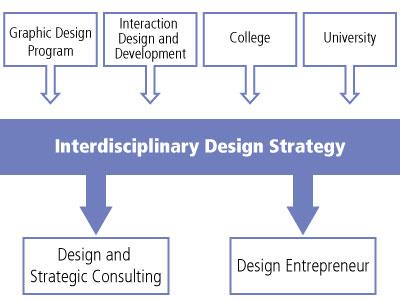Interdisciplinary Design Strategy Program (Postgraduate) at the Brookfield Sustainability Institute (G414)

Program Description
Program Overview
The Interdisciplinary Design Strategy program at the Brookfield Sustainability Institute is a global solutions studio focused on identifying, understanding, and developing smart sustainable solutions to help fight climate change.
Full Description
The Interdisciplinary Design Strategy program at the Brookfield Sustainability Institute is a global solutions studio focused on identifying, understanding, and developing smart sustainable solutions to help fight climate change.
Transform The World
The Brookfield Sustainability Institute (BSI) is built on the 20-year legacy of the Institute without Boundaries (IwB), a think tank at George Brown College that fosters collaborative design practices for a better world. This evolution is a response to the vast social, economic, and environmental disruptions caused by the acceleration of climate change which puts sustainability at the core of everything we do.
Each September, a small group of students begins a nine-month graduate certificate program in Interdisciplinary Design Strategy, where they work as a team to research, design, and realize real-world projects in partnership with governments, non-profits, private companies, and George Brown College.
Cross Boundaries
This program will accept strong candidates representing different fields – for example, an architect, engineer, designer, planner, economist, an artist, a scientist. The program will produce a new breed of designer - one who can articulate possibilities. In the words of Buckminster Fuller, a "synthesis of artist, inventor, mechanic, objective economist and evolutionary strategist."
The goal of the BSI is to foster a new generation of talent with the foresight and skills to think systemically, collaborate, and build sustainably. Through an interdisciplinary learning model, students develop applied research and innovation projects that tackle real-world sustainability challenges alongside community and industry partners.
Learn By Doing
Students will engage in a full range of creative work necessary for interdisciplinary design strategy, from research and writing to design and production, and will learn everything necessary to realize these outcomes:
- how to ask questions
- how to listen
- how to research
- how to work with images
- how to engage others
- how to communicate ideas
- how to be a leader and allow others to lead
- how to work with others
- how to make mistakes
- how to take risks
- how to throw away good ideas
Broaden Horizons
Historically, projects at the Institute without Boundaries, now BSI, often involve international travel to collaborate with communities around the world. Some examples of the places we’ve been to include Matapalo (Costa Rica), Lota (Chile), Milan (Italy), Dublin (Ireland), New York City, and Chicago. Students are responsible for some additional travel expenses for projects like these.
Work In Reality
The first project of the Institute, created by the 2003 and 2004 classes, was Massive Change: The Future of Global Design, which resulted in a book and travelling exhibition.
The World House Project, starting in 2006, was a three-year initiative that looked at housing systems that are globally responsible and locally appropriate. Students and faculty developed housing models for Canada and Costa Rica that are sustainable, intelligent, universal, and affordable.
In September 2009, the Institute embarked on a new project: City Systems. The objective was to explore, dissect and reimagine the complexities of urban life.
In 2013, the Institute expanded on City Systems with a new five-year initiative: Regional Ecologies, looking at urbanization as a regional phenomenon.
In 2016–17, the Institute continued its research on Regional Ecologies, focusing on "symbiotic regions" with the challenge to demonstrate how cities can cooperate at a regional scale to better deliver services, attract investment, and create more resilient social and physical infrastructure for living regionally. The partner was Waterfront Toronto.
In 2017–18, the IwB worked with Toronto Global, Neptis Foundation and the Institute for Competitiveness and Prosperity to rethink the Toronto Region as a unified economic region and catalyst for attracting investment.
From 2018-2022 the IwB focused on the Future Ways of Living, both a research method and a call to action developed to foster anticipatory design. As a research method, it aimed to investigate and visualize the past and present forces shaping society, which inform an understanding of potential futures. As a call to action, it challenged us to imagine and create what ought to be, rather than what exists.
In 2022, the IwB transformed into the Brookfield Sustainability Institute, a global solutions studio focused on identifying, understanding, and developing smart sustainable solutions to help fight climate change.
The BSI continues to partner with industry leaders and organizations to elevate our education and training programs and prepare students for real-life challenges. As an Institute the BSI is committed to providing paid talent development programs through our participatory learning model.
Join The Movement
For more information, visit https://www.brookfieldsustainabilityinstitute.com/
For more information on the legacy of the Institute without Boundaries, please visit https://institutewithoutboundaries.ca/
Career & Postgraduate Study Opportunities
Educational Pathways
Alumni Impact
We are immensely proud of the contributions of our alumni in Toronto and around the globe.
From Michelin-starred restaurants to major construction, entertainment, community and financial organizations, our graduates are truly making an impact across a range of industries.
Latest alumni stories
Courses
Required Courses
SEMESTER 1
| Code | Course Name | Prerequisite |
|---|---|---|
| DESN 4003 | Design Project 1: Communications | |
| DESN 4012 | Design Project 2: Product, Systems and Services | |
| DESN 4005 | Design Project 3: Environment | |
| DESN 4007 | Design Issues, History and Theory | |
| DESN 4008 | Integrated Design Process: Tools, Strategies, Methods and Practices | |
| DESN 4009 | Charrettes I | |
| DESN 4010 | Major Project: Preparation |
SEMESTER 2
| Code | Course Name | Prerequisite |
|---|---|---|
| DESN 4021 | Major Project: Development | DESN 4003 and DESN 4005 and DESN 4007 and DESN 4008 and DESN 4009 and DESN 4010 and DESN 4012 |
| DESN 4022 | Major Project: Communication | DESN 4003 and DESN 4005 and DESN 4007 and DESN 4008 and DESN 4009 and DESN 4010 and DESN 4012 |
| DESN 4024 | Charrettes II | DESN 4009 and DESN 4010 and DESN 4008 |
| DESN 4026 | Design Strategies: Professional Practice | DESN 4010 and DESN 4008 |
| DESN 4027 | Integrated Design Process II | DESN 4008 and DESN 4010 |
Articulation Agreement
Students who successfully complete the graduate certificate in Interdisciplinary Design Strategy at the School of Design, George Brown College, are eligible to apply for advanced entry into a Master of Arts in Interdisciplinary Design Strategies offered by the Institute of Art, Design + Technology in Dún Laoghaire, Ireland. Learn more about this opportunity.
Program Learning Outcomes
The graduate demonstrates the ability to:
- Apply universal and sustainable design principles to complex global problems in order to create intelligent solutions that address environmental, social and economic challenges.
- Manage an Integrated Design Process to deliver human-centred design strategy projects for government, corporations and nonprofit organizations.
- Design collaboratively in an interdisciplinary studio environment to complete environmental, communication, product, service and system design projects.
- Apply primary and secondary research methodologies to the design process using a think/make practice model to achieve project outcomes that meet user needs.
- Adhere to the professional practices of a design studio in order to facilitate the success of design teams in achieving project results.
- Participate in a multiphase design process in order to create a holistic, integrated and realistic design project.
- Liaise and manage the design process to provide solutions for clients, including design, documentation, tendering, fabrication and delivery.
- Present research results and design solutions to a diverse audience utilizing effective communication strategies.
Tuition & Fees
Domestic Tuition
International Tuition
Additional Costs
* Amounts listed are the total of tuition, materials (non-refundable), student service and ancillary fees for the first two semesters of programs starting in Fall 2022. Fees are subject to change for programs starting in Fall 2023 and at later dates.
** Amounts listed are the total of tuition, materials, student service and ancillary fees for the first two semesters of programs starting in Fall 2023. Fees are subject to change for programs starting in Fall 2024 and at later dates.
Some specialized programs have higher tuition fees which will be specified on official College invoices.
International Students
Visit the International Fees and Related Costs page for more information.
Financial Assistance
Each year we award over $2 million dollars in scholarships, awards and bursaries to first-year students. Check out our financial aid webpages for ways to pay for college and the full list of available scholarships, awards and bursaries.
This program is approved for OSAP funding, provided the applicant meets OSAP eligibility criteria.
Disclaimer: The information contained in this website is subject to change without notice. It should not be viewed as a representation, offer or warranty. Students are responsible for verifying George Brown College fee requirements.
Admission Requirements
- diploma or bachelor's degree
- applicant questionnaire*
- resumé*
- digital portfolio*
* Qualified applicants will be invited to complete the online application questionnaire, including links to view or download a resumé and portfolio.
Details on these supplementary requirements will be communicated at a later date to qualified applicants, as part of the review process.
English Language Proficiency
Applicants with international transcripts who do not provide English proficiency test results must test at the college level in the George Brown College English assessment to be considered for admission.
Please visit English Proficiency for more details.
Note: This program continues to accept applications until the seats are filled, which is typically July or August before the September start date. Check the program availability page for program status.
International Students
Visit the International Admissions page for more information regarding country specific admission requirements.
How to Apply
Domestic students should apply through Ontario Colleges.
International Students
Visit the How to Apply page for more information on how and when to apply.
International students should apply through the George Brown College Online Application System.
Contact Us
Phone: 416-415-5000, ext. 2137
Email: IDSP@georgebrown.ca
Academic Coordinator, IDSP, Brookfield Sustainability Institute (BSI), Sandhya Casson, Sandhya.casson@georgebrown.ca
For more information about George Brown College, you may also call the Contact Centre at 416-415-2000 or long distance 1-800-265-2002.
Contact one of our international recruitment representatives specializing by country of origin by either booking a virtual meeting or submitting an inquiry. For more information visit the International Contact Us page
Visit Our Campus
This program is part of our School of Design, located at our Waterfront Campus, at 3 Lower Jarvis St., Toronto, Ontario, Canada.
The School of Design resides in a new 103,000-square-foot facility in the Daniels Waterfront – City of the Arts development. This state-of-the-art building supports academic programs and industry projects with features such as:
- virtual and augmented reality lab
- usability and testing lab
- Future Ways of Living lab
- peer tutor lab
- digital sandbox
- incubators
- prototyping and workshop spaces
- design and innovation showcase spaces
Come and have your questions answered, learn about the program content and career options, meet your friendly professors and staff and experience what it is like to be in a George Brown College classroom at one of our information sessions. You can also book a campus tour.

